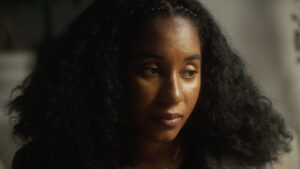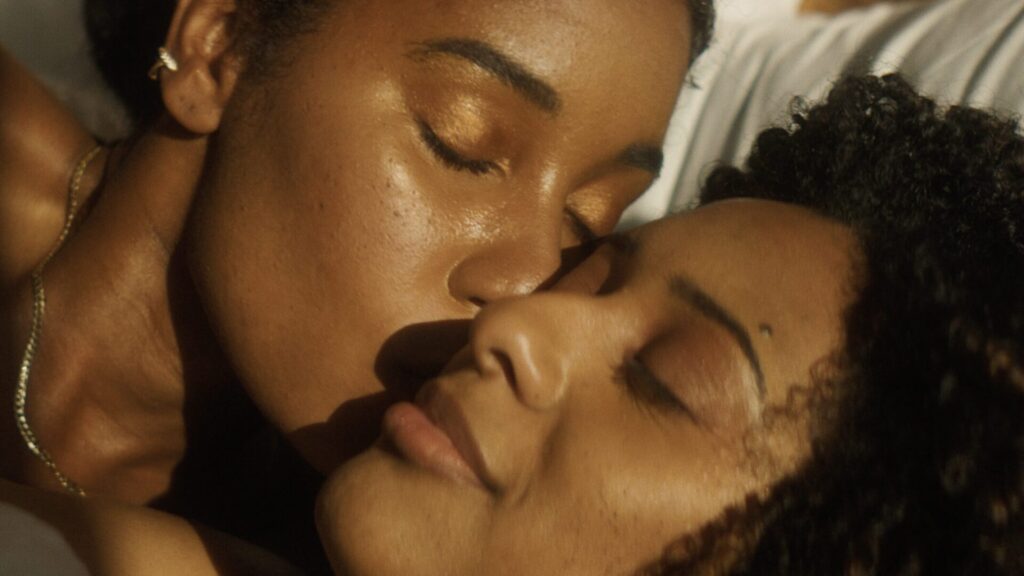In the growing tapestry of Black queer cinema, Drip Like Coffee, directed by Anaiis Cisco, shines as a sensual and compelling narrative that champions the power of love, self-discovery, and the complexity of relationships. Showcasing at the 2024 NewFest Festival, this intimate film explores the deeply personal experiences of two Black women, Kali and Mel, as they navigate their queerness, their relationships, and their own identities. In a world where queer stories are often relegated to the margins, Drip Like Coffee boldly steps into the spotlight, highlighting the richness and depth of Black queer lives. It’s a vital addition to the conversation on representation, portraying not only the beauty and intimacy of queer relationships but also the struggles and complexities that accompany them.
The film opens with a familiar and intimate scene: Kali, a barista, is in a braiding salon, having her hair cornrowed. This moment sets the tone for the film—a celebration of Black culture, womanhood, and queer identity. The opening dialogue offers a peek into Kali’s strained relationship with her boyfriend, who has been staying with her and her aunt for months. Financial instability and the weight of unspoken expectations cloud their dynamic, but it’s Kali’s connection with Mel, an up-and-coming photographer, that offers her a glimmer of hope. The tension between her obligations to her boyfriend and the budding chemistry she shares with Mel creates the central conflict of the story, one that weaves through their interactions and choices.
Kali’s world is dominated by uncertainty, particularly when her aunt prohibits her boyfriend from staying over. Kali, stuck in the middle, chooses to leave with him, though the relationship is strained, and her departure hints at the turbulent road ahead. The film contrasts Kali’s home life with her work at a local café, where her encounter with Mel unfolds. Their chemistry is palpable, and Cisco masterfully captures this through intimate shots behind the café counter, where the close framing and careful choreography of their movements suggest a subtle but undeniable connection. The two women share quiet, knowing glances, exchanging more through their bodies than words, and slowly, the tension between them builds.

The café scenes, especially those where the two work together, are beautifully shot with soft, shallow focus and medium shots that highlight the rich melanin of the actresses, Kashanie Lagrotta-Butler (Mel) and Iman Artwell-Freeman (Kali). The cinematography works in harmony with the script, framing the two characters in intimate, fleeting moments of connection. The scene where Mel compliments Kali on her chocolate cappuccino foam becomes a metaphor for their growing bond—“Who doesn’t like chocolate?” Kali says, a simple line that encapsulates the warmth and comfort the two begin to offer each other.
The relationship between Kali and Mel is a dance of discovery. Their awkwardness shifts into something more fluid, a connection that speaks to a shared understanding of who they are and what they desire. However, both are navigating existing relationships. Mel, in a complicated partnership with Gio (played by Danny Vasquez)—her long-standing open-relationship partner—faces the challenge of Gio not fully embracing her attraction to women. Kali, meanwhile, struggles with the dichotomy of her ongoing relationship with her boyfriend, Lee (played by Ralphy Lopez)-her first love, and the new feelings she experiences for Mel. The narrative is full of tension as the two women get closer, culminating in a scene where they nearly kiss, only to be interrupted, adding a layer of frustration and desire that lingers throughout the film.

As the film progresses, Kali and Mel’s connection deepens, but the complications of their lives are not easily shaken. Kali’s boyfriend, Lee, becomes increasingly jealous, and the tension between them escalates after an intense confrontation. The film’s visual storytelling—especially the use of color—mirrors this emotional journey. When Mel and Kali share a moment of bliss, the lighting shifts to a rich purple haze, signaling their freedom and joy. The contrast between this ethereal moment and the harsher, more grounded realities they face highlights the complexity of their desires and the emotional toll of their relationships.
The most poignant scenes in Drip Like Coffee come in the form of quiet moments: Kali and Mel alone in a dimly lit room, Kali contemplating her life while Mel unbraids her hair. This is not only a moment of vulnerability but also a symbolic gesture of liberation, as Mel’s hands gently work through Kali’s hair, unraveling both physical and emotional knots. As they share intimate conversations about the past and present, the complexity of their feelings for one another becomes clearer. It is in these spaces of softness and tenderness that the film truly excels.

The final act of the film is a cathartic release. Mel ends things with Gio, and her solo exhibition becomes a visual representation of her own transformation. Kali supports her, marking a shift from a space of confusion to one of clarity. When Mel returns to the gallery and finally acknowledges that Kali is the one she truly desires, the culmination feels inevitable yet still incredibly moving. In the film’s final scenes, the two women share a quiet, blissful embrace, standing against a backdrop of Brooklyn’s skyline, illuminated by soft purple and blue hues. It is a visual metaphor for their journey—an uncertain beginning, a tumultuous middle, and a hopeful, transformative end.
Behind the Scenes with Anaiis Cisco: Q&A with the Director
In a recent conversation with GLAAD, we had the opportunity to sit down with director Anaiis Cisco to learn more about the making of Drip Like Coffee and what this film means to her. Check it below!
_____________________________________________________________________________
GLAAD: What inspired you to create Drip Like Coffee?
Anaiis Cisco: The inspiration came from my own experience of coming into my queerness while living in Brooklyn. I was navigating complicated relationships and trying to find the space to process my desires. I didn’t have much space to process and turned to writing to unpack what it meant to desire something new. That’s how Drip Like Coffee was born.
GLAAD: The film’s use of a café setting is so evocative. How did that come about?
Anaiis Cisco: I’ve always loved the community feel of cafés. They’re these intimate yet public spaces where you can be yourself or observe others. I integrated the café space and developed Kali and Mel into baristas, using coffee as a symbol for their fluid exchange as coworkers and lovers. The café setting became a metaphor for the connection they were building.

GLAAD: What made you decide to expand the story from a short film to a feature?
Anaiis Cisco: Initially, I started with a short because I wanted to test the waters with the story and the characters. But as I developed the script, I realized there was so much more to explore. I wanted to show two experiences of Black women faced with the lack of space to figure out what it means to be together. Expanding it into a feature allowed me to delve into their individual journeys and create a more layered narrative.
GLAAD: How did your personal journey influence the characters of Kali and Mel?
Anaiis Cisco: Both characters reflect different aspects of my own experience. Kali’s hesitation and her struggle to balance her current relationship with her newfound feelings mirror my journey of self-discovery. Mel’s journey, on the other hand, represents the courage it takes to embrace something new. Together, they’re a dialogue about vulnerability, desire, and growth.


GLAAD: Can you talk about the visual language of the film? The lighting, especially, feels so intentional.
Anaiis Cisco: Absolutely. Lighting was a key element in conveying the emotional states of the characters. For example, the rich purple hues in the moments of joy and connection between Kali and Mel symbolize liberation and intimacy. In contrast, the colder tones in Kali’s home life reflect the constraints she feels. The visual language was a way to tell their story without words.

GLAAD: What do you hope audiences take away from Drip Like Coffee?
Anaiis Cisco: I want audiences to feel seen and understood. This film is about love, transformation, and the complexities of identity. For Black queer women especially, I hope this story resonates deeply and offers a sense of validation. Ultimately, I want everyone who watches to reflect on their own journey of desire, connection, and self-discovery.
GLAAD: What’s next for you as a filmmaker?
Anaiis Cisco: I’m currently working on another feature that explores intergenerational stories within Black communities. It’s a project close to my heart, and I’m excited to continue creating work that amplifies underrepresented voices and tells stories with authenticity and depth.
Drip Like Coffee is more than just a film; it’s a heartfelt celebration of Black queer identity, intimacy, and self-discovery. We’re excited to see what Anaiis Cisco creates next! Follow her on Instagram @anaiis05, visit the film’s website here, and check out its Instagram @driplikecoffee.













